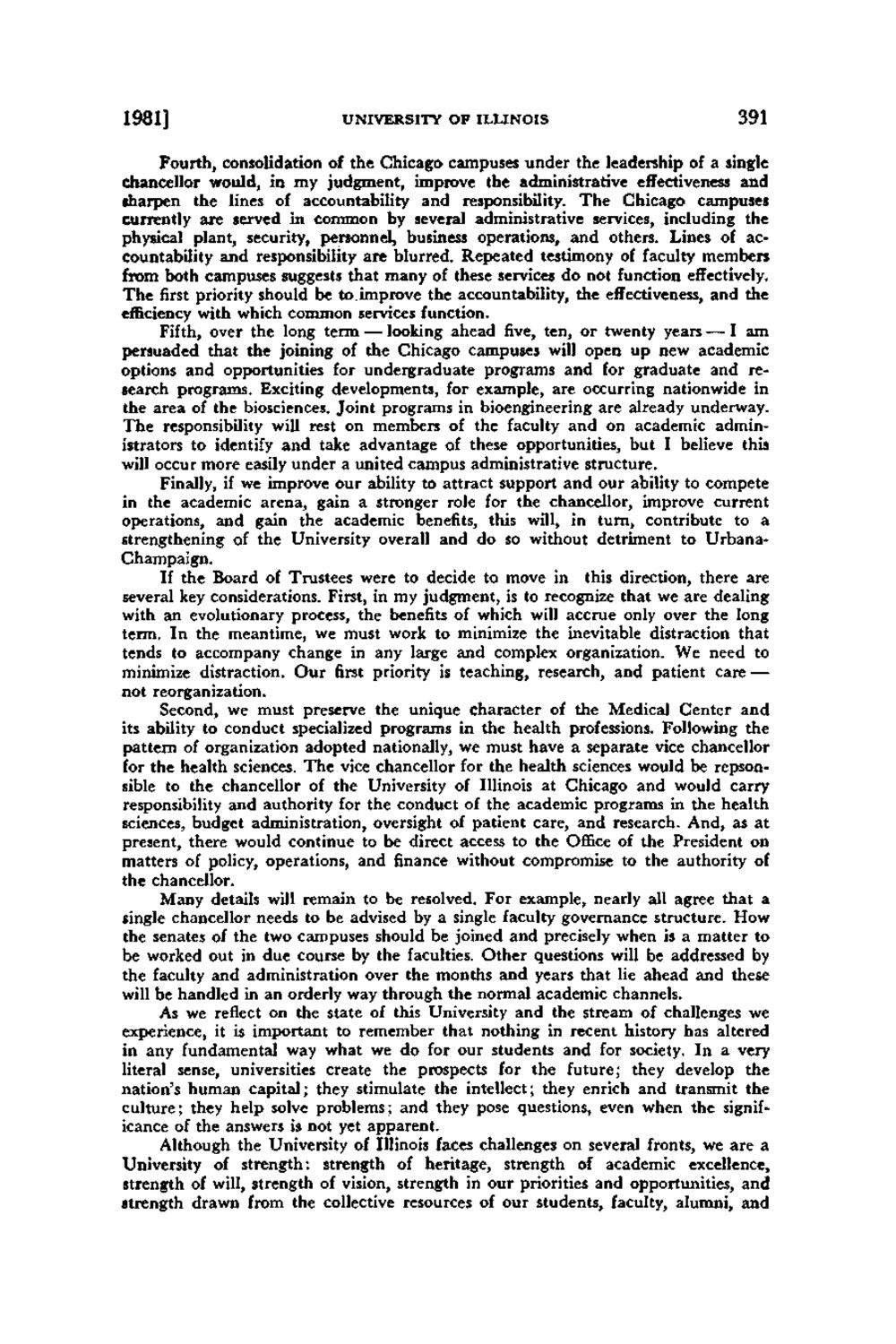| |
| |
Caption: Board of Trustees Minutes - 1982
This is a reduced-resolution page image for fast online browsing.

EXTRACTED TEXT FROM PAGE:
1981] UNIVERSITY OF ILLINOIS 391 Fourth, consolidation of the Chicago campuses under the leadership of a single chancellor would, in my judgment, improve the administrative effectiveness and sharpen the lines of accountability and responsibility. T h e Chicago campuses currently are served in common by several administrative services, including the physical plant, security, personnel, business operations, and others. Lines of accountability and responsibility are blurred. Repeated testimony of faculty members from both campuses suggests that many of these services do not function effectively. The first priority should be to.improve the accountability, the effectiveness, and the efficiency with which common services function. Fifth, over the long term — looking ahead five, ten, or twenty years — I am persuaded that the joining of the Chicago campuses will open up new academic options and opportunities for undergraduate programs and for graduate and research programs. Exciting developments, for example, are occurring nationwide in the area of the biosciences. Joint programs in bioengineering are already underway. The responsibility will rest on members of the faculty and on academic administrators to identify and take advantage of these opportunities, but I believe this will occur more easily under a united campus administrative structure. Finally, if we improve our ability to attract support and our ability to compete in the academic arena, gain a stronger role for the chancellor, improve current operations, and gain the academic benefits, this will, in turn, contribute to a strengthening of the University overall and do so without detriment to UrbanaChampaign. If the Board of Trustees were to decide to move in this direction, there are several key considerations. First, in my judgment, is to recognize that we are dealing with an evolutionary process, the benefits of which will accrue only over the long term. In the meantime, we must work to minimize the inevitable distraction that tends to accompany change in any large and complex organization. We need to minimize distraction. Our first priority is teaching, research, and patient care — not reorganization. Second, we must preserve the unique character of the Medical Center and its ability to conduct specialized programs in the health professions. Following the pattern of organization adopted nationally, we must have a separate vice chancellor for the health sciences. The vice chancellor for the health sciences would be repsonsible to the chancellor of the University of Illinois at Chicago and would carry responsibility and authority for the conduct of the academic programs in the health sciences, budget administration, oversight of patient care, and research. And, as at present, there would continue to be direct access to the Office of the President on matters of policy, operations, and finance without compromise to the authority of the chancellor. Many details will remain to be resolved. For example, nearly all agree that a single chancellor needs to be advised by a single faculty governance structure. How the senates of the two campuses should be joined and precisely when is a matter to be worked out in due course by the faculties. Other questions will be addressed by the faculty and administration over the months and years that lie ahead and these will be handled in an orderly way through the normal academic channels. As we reflect on the state of this University and the stream of challenges we experience, it is important to remember that nothing in recent history has altered in any fundamental way what we do for our students and for society. In a very literal sense, universities create the prospects for the future; they develop the nation's human capital; they stimulate the intellect; they enrich and transmit the culture; they help solve problems; and they pose questions, even when the significance of the answers is not yet apparent. Although the University of Illinois faces challenges on several fronts, we are a University of strength: strength of heritage, strength of academic excellence, strength of will, strength of vision, strength in our priorities and opportunities, and strength drawn from the collective resources of our students, faculty, alumni, and
| |